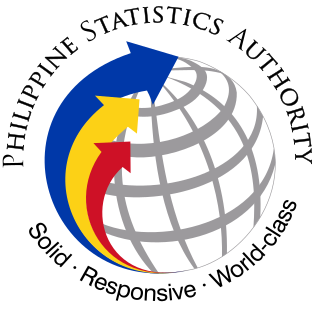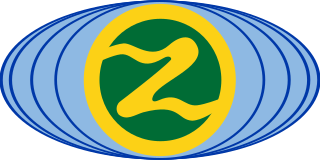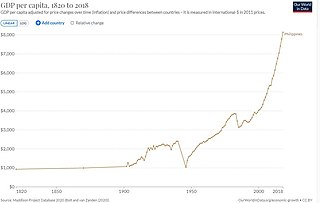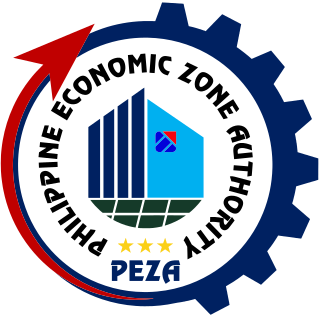Related Research Articles

The economy of the Philippines is an emerging market, and considered as a newly industrialized country in the Asia-Pacific region. In 2024, the Philippine economy is estimated to be at ₱26.55 trillion, making it the world's 32nd largest by nominal GDP and 13th largest in Asia according to the International Monetary Fund.
A state-owned enterprise (SOE) is a business entity which is established and/or owned by a national or state/provincial government, by an executive order or an act of legislation, in order to earn profit for the government, control monopoly of the private sector over means of production, provide commodities to citizens at a lower price, implement government policies, and/or to deliver products and services to remote locations that otherwise have trouble attracting private vendors. The national or state/provincial government will hold either all or majority equity over the assets of these enterprises, and often has direct jurisdiction over their operations. Defining characteristics of SOEs are their distinct legal form and possession of financial goals and developmental objectives, and they can be considered government entities established to pursue financial objectives from the commercial market and achieve state capitalist goals.

Cagayan Valley, designated as Region II, is an administrative region in the Philippines. Located in the northeastern section of Luzon, it is composed of five Philippine provinces: Batanes, Cagayan, Isabela, Nueva Vizcaya, and Quirino. The region hosts four chartered cities: Cauayan, Ilagan, Santiago, and Tuguegarao.

Bataan, officially the Province of Bataan, is a province in the Central Luzon region of the Philippines. Its capital is the city of Balanga while Mariveles is the largest town in the province. Occupying the entire Bataan Peninsula on Luzon, Bataan is bordered by the provinces of Zambales and Pampanga to the north. The peninsula faces the South China Sea to the west and Subic Bay to the north-west, and encloses Manila Bay to the east.

The Securities and Exchange Board of India (SEBI) is the regulatory body for securities and commodity market in India under the administrative domain of Ministry of Finance within the Government of India. It was established on 12 April 1988 as an executive body and was given statutory powers on 30 January 1992 through the SEBI Act, 1992.
Innovation, Science and Economic Development Canada is a department of the Government of Canada. ISED is responsible for a number of the federal government's functions in regulating industry and commerce, promoting science and innovation, and supporting economic development. The department was known as Industry Canada (IC) prior to 2015.

The Philippine Statistics Authority is the central statistical authority of the Philippine government that collects, compiles, analyzes, and publishes statistical information on economic, social, demographic, political affairs, and general affairs of the people of the Philippines, as well as enforcing the civil registration functions in the country.

The Department of Trade and Industry is the executive department of the Philippine government responsible for the advancement, promotion, governance, regulation, management and growth of industry and trade.

The Department of Tourism is the executive department of the Philippine government responsible for the regulation of the Philippine tourism industry and the promotion of the Philippines as a tourist destination.

The National Economic and Development Authority is an independent cabinet-level agency of the Philippine government responsible for economic development and planning. It is headed by the president of the Philippines as chairman of the NEDA board, with the Secretary of Socioeconomic Planning as vice-chairman. A number of Cabinet members, the Governor of the Bangko Sentral ng Pilipinas, the Chairperson of the Metropolitan Manila Development Authority, the Chief Minister of Bangsamoro, the Secretary of Information and Communications Technology, the Chairman of the Subic–Clark Area Development Corporation, and the National President of the Union of Local Authorities of the Philippines are members of the NEDA Board.

The Securities and Exchange Commission is the agency of the Government of the Philippines charged with the registration and supervision of corporations and securities, as well as capital market institutions and participants, in the Philippines. As such, the Commission champions investor protection in the Philippines, as part of its mandate.
Miguel B. Varela was a Filipino businessman, corporate lawyer, and management practitioner. He was the president and chairman of the Philippine Chamber of Commerce and Industry (PCCI), the largest business organization in the Philippines. He was also the president of the Employers Confederation of the Philippines (ECOP), the largest association of employers in the country.

Foreign relations between Australia and Philippines, cover a broad range of areas of cooperation including political, economic, development, defence, security and cultural relations between Australia and the Philippines. Australia has an embassy in Manila. The Philippines has an embassy in Canberra, consulate generals in Sydney, Melbourne, and Darwin, consulates in Brisbane, Hobart, and Perth, and an honorary consulate in Adelaide.

The Zamboanga City Special Economic Zone (or ZamboEcoZone), otherwise known by its corporate name as Zamboanga Freeport Authority (ZFA), is a special economic zone located in Zamboanga City in the province of Zamboanga del Sur in Mindanao, Philippines. It is the only economic zone located in Western Mindanao.

The economic history of the Philippines chronicles the long history of economic policies in the nation over the years.
In the Philippines, a government-owned and controlled corporation (GOCC), sometimes with an "and/or", is a state-owned enterprise that conducts both commercial and non-commercial activity. Examples of the latter would be the Government Service Insurance System (GSIS), a social security system for government employees. There are 219 GOCCs as of 2022. GOCCs both receive subsidies and pay dividends to the national government. A government-owned or controlled corporation is a stock or a non-stock corporation, whether performing governmental or proprietary functions, which is directly chartered by a special law or if organized under the general corporation law is owned or controlled by the government directly, or indirectly through a parent corporation or subsidiary corporation, to the extent of at least a majority of its outstanding capital stock or of its outstanding voting capital stock.

The Philippine Economic Zone Authority (PEZA), formerly known as the Foreign Trade Zone Authority (FTZA) and Export Processing Zone Authority (EPZA), is a Philippine government agency attached to the Department of Trade and Industry.

The Philippine Space Agency (PhilSA) is the national space agency of the Philippines.

Menardo Ilasco Guevarra is a Filipino lawyer serving as Solicitor General of the Philippines since 2022 under President Bongbong Marcos. He previously served as the Secretary of Justice under President Rodrigo Duterte and as a commissioner of the Philippine Competition Commission under President Benigno Aquino III. Before joining the government, he was involved in private litigation practice as a founding partner of the Medialdea Ata Bello Guevarra & Suarez law firm since 1990. He was also an active faculty member at his alma mater Ateneo de Manila University, where he graduated in 1974.
References
- ↑ Integrated Corporate Reporting System. "National Development Company" . Retrieved August 19, 2024.
- ↑ Reyes, Marita R. (1997). Corporate strategies the National Development Company (Master of Business Administration thesis). De La Salle University. Retrieved August 19, 2024.
- ↑ National Development Company. "Corporate Profile" . Retrieved August 19, 2024.